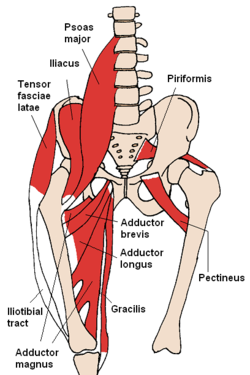Pectineus muscle
| Pectineus | |
|---|---|

The pectineus and nearby muscles
|
|

Structures passing behind the inguinal ligament (pectineus visible at bottom right.)
|
|
| Details | |
| Origin | Pectineal line of the pubic bone |
| Insertion | Pectineal line of the femur |
| Artery | Obturator artery |
| Nerve | Femoral nerve, sometimes obturator nerve |
| Actions | Thigh - flexion, adduction |
| Identifiers | |
| Latin | Musculus pectineus |
| TA | A04.7.02.025 |
| FMA | 22440 |
|
Anatomical terms of muscle
[]
|
|
The pectineus muscle (from the Latin word pecten, meaning comb) is a flat, quadrangular muscle, situated at the anterior (front) part of the upper and medial (inner) aspect of the thigh. The pectineus muscle is the most anterior adductor of the hip. The muscle does adduct and externally rotate the thigh but its primary function is hip flexion.
It can be classified in the medial compartment of thigh (when the function is emphasized) or the anterior compartment of thigh (when the nerve is emphasized).
The pectineus muscle arises from the pectineal line of the pubis and to a slight extent from the surface of bone in front of it, between the iliopectineal eminence and pubic tubercle, and from the fascia covering the anterior surface of the muscle; the fibers pass downward, backward, and lateral, to be inserted into the pectineal line of the femur which leads from the lesser trochanter to the linea aspera.
The pectineus is in relation by its anterior surface with the pubic portion of the fascia lata, which separates it from the femoral artery and vein and internal saphenous vein, and lower down with the profunda artery.
By its posterior surface with the capsule of the hip joint, and with the obturator externus and adductor brevis, the obturator artery and vein being interposed.
...
Wikipedia
